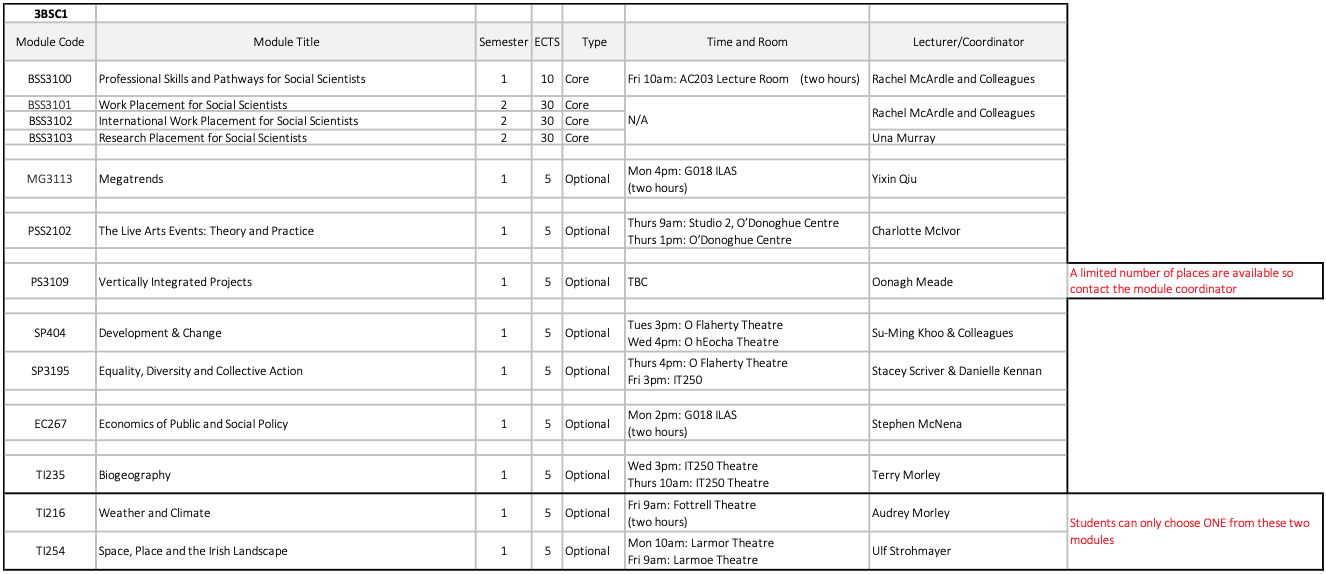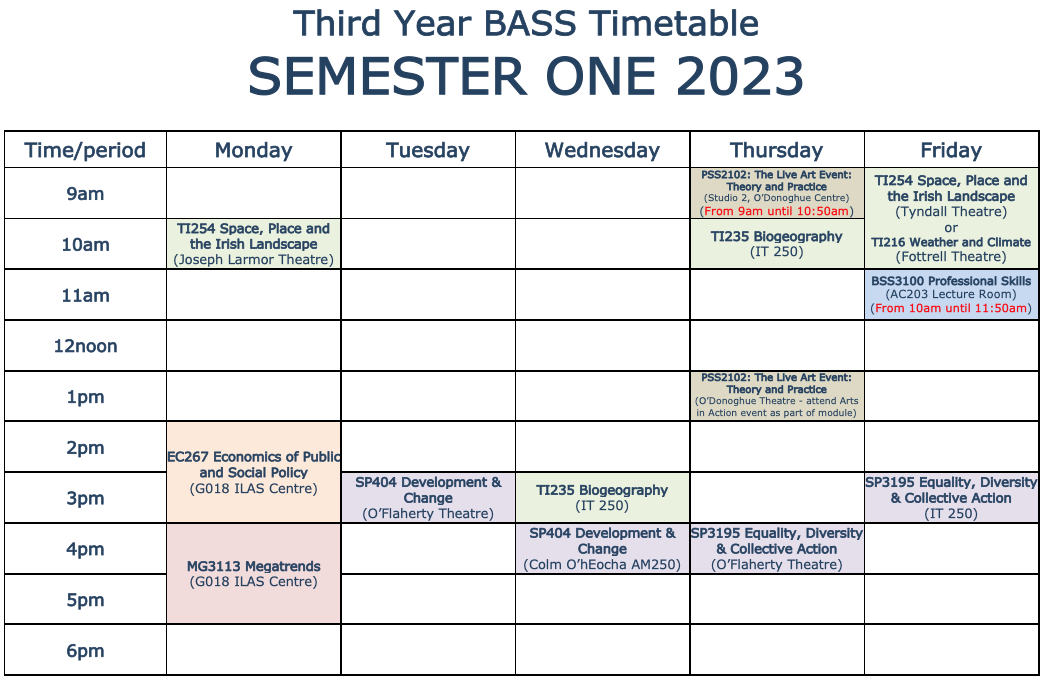The Bachelor of Science (Social Sciences)
A webpage for current third year students of the programme | 2021 - 2025
The new academic year and first teaching semester will begin on Monday 4th September 2023 with all classes taking place on-campus.
Students must complete 60ECTS this academic year to progress into their third year of the programme


Student Handbooks
The 2023 - 2024 third year BASS student handbook is not complete and will be continuously updated in the coming weeks...
Third Year BASS Student Handbook | 2023 - 2024Third Year Soc & Pol Modules | 2023 - 2024
The University of Galway Guide for Citing Harvard Style and Essay Help and Information
Harvard Style Citing & ReferencesHarvard Style Referencing Handout
Essay Submission Form
Essay Appraisal Form
Some Important Information and Links
Students' Queries Recommended StepsExtenuating Circumstances Policy Extenuating Circumstances Online Form
Exam Deferral Policy Exam Deferral Online Form
Extended Leave of Absent
Student Support Services
- GALWAY 50808 is 24/7 free, confidential, anonymous text response service available to any University of Galway student experiencing a crisis of any kind such as relationships, loneliness, job loss, money, assault, high anxiety or low mood
- By texting GALWAY to 50808 you will receive a reply within 5 minutes from a highly trained and motivated volunteer who will provide a warm listening ear and signposting to local supports and services. So if you experience a crisis of any kind at any time of the day or night, there is no need to suffer in silence, immediate support is available by texting GALWAY to 50808. Your family and friends can also avail of this service by texting ‘Hello’ to 50808
-
Chaplaincy
The Chaplaincy Office, 6 Distillery Road, University of Galway
Fr Ben Hughes, Chaplain: ben.hughes@universityofgalway.ie T: 087 203 7538
Jimmy McGovern, Seas Suas Manager: jimmy.mcgovern@universityofgalway.ie T: 083 062 6898 -
Counselling
For enquiries or to set up an online/phone assessment please email: counselling@universityofgalway.ie -
University of Galway Student Services & Students Union
www.universityofgalway.ie/student-life/student-support/. The Students Union web page provides valuable information and guidance for students about a range of issues: su.nuigalway.ie/help-advice/ -
Other health and emergency contacts
- Student Health Unit University of Galway: 091 492604 www.universityofgalway.ie/health_unit/
- Your own GP
- University Hospital Galway Emergency Department: 091 544544
- The Samaritans: 116 123
- Pieta House: 1800 247 247.
Academic Integrity Policy
The University of Galway Academic Integrity Policy was revised in September 2023.
As the Policy states, ‘Academic misconduct is any attempt to gain or help others gain an unfair academic advantage’. This can be ‘intentional or inadvertent’, and can be committed in a variety of ways (University of Galway 2022).
The following examples of academic misconduct are quoted from the University Policy (please note that this is not an exhaustive list):
- ‘Submitting work as your own for assessment, which has, in fact, been done in whole or in part by someone else’
- ‘Cheating in exams (e.g., crib notes, copying, using disallowed tools, impersonation)’
- ‘Cheating in projects (e.g., collusion; using ‘essay mills’ to carry out the allocated part of the project)’
- ‘Self-plagiarism where you submit work which has previously been submitted for a different assignment without permission/acknowledgement’
- ‘Posting advertisements for services which encourage contract cheating either physically or virtually’
- ‘Submitting all or part of an assessment item which has been produced using artificial intelligence (e.g. Google Translate or other machine translation services/software, AI essay writing service etc.) and claiming it as your own work’.
Source:
University of Galway (2022) ‘QA220 Academic Integrity Policy’ AVAILABLE TO DOWNLOAD HERE
How to Write a Formal Email as a University Student
- You must use your student email address
- Stick to a professional black font
- Always include a short and accurate subject line
- Use a proper salutation (e.g. ‘Dear Sir’ or ‘Dear Dr Reilly’)
- Make sure you are making contact with the correct lecturer/tutor/teacher
- Introduce yourself in the first paragraph (name and student number), and the module you refer to in the email
- Prioritise the most important information and get to the point quickly
- Keep your message/question brief
- Use formal language and do not use slang or text speak
- Use a proper form of closing (e.g. 'kind regards')
- Include any necessary documents or attachments
- Proofread your message for meaning, spelling, and grammar
- Make sure that the email does not contain any sensitive information
- Always be realistic about a timeframe for a response (you should never expect a response in the evening or over the weekend).